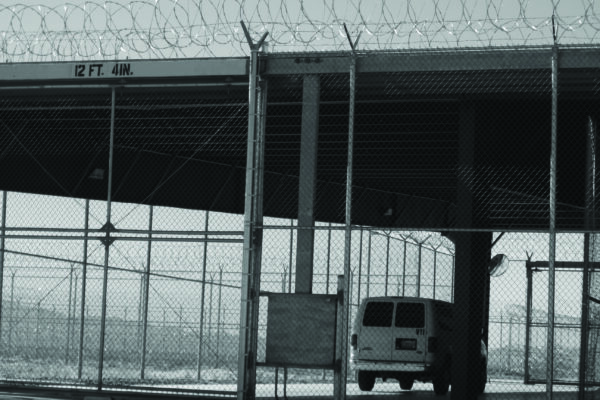“Every day you get tired from thinking, ‘Am I going to be released after one month, two months, three months?’ But every day it’s ‘tomorrow’ and it’s never finished.”
For ten months as he languished inside the Immigration and Customs Enforcement (ICE) detention facility in Otero County, New Mexico, Firas lived in a constant state of uncertainty, never knowing if or when he would see his wife and six children again. He was stuck in limbo, caught between a country that refused to acknowledge him and a country that wanted him expelled.
"He was stuck in limbo, caught between a country that refused to acknowledge him and a country that wanted him expelled."
Firas was born in East Jerusalem in 1977, ten years after Israel annexed the territory from Palestine in 1967. As a Palestinian Jerusalemite, he has never enjoyed Israeli citizenship, but rather, permanent legal status in the very country where he was born. Israel claims he relinquished that legal status when he became a lawful permanent resident of the United States.
The Trump administration, in its zeal to deport as many immigrants as possible, repeatedly tried to obtain Israeli travel documents for his deportation beginning in January 2018 after Firas received a conviction for a drug offense the year prior. Israel refused to issue the documents. The two nations were at an impasse, with Firas stuck in the middle. As the negotiations dragged on ICE insisted on keeping Firas locked up and away from his family even though he posed no threat to public safety. It didn’t matter that Firas had lived in the U.S. for seventeen years, that he was married to a U.S. citizen, and that he had six U.S. citizen children. To ICE, he was just more grist for the deportation mill.
“I didn’t know I would have to stay so long over there. They just leave you,” said Firas. “I kept thinking to myself, ‘what is going on? What do you guys need from me? How can I help speed up the process?”
"Days turned into nights. Nights turned into weeks. Weeks bled into months."
Days turned into nights. Nights turned into weeks. Weeks bled into months.
In September, the U.S. government set its sights on Jordan — the country that issued Firas’ birth certificate, even though he has never lived there. But Jordan also refused to issue travel documents.
Back home, Firas’ wife struggled to care for their six children by herself. Their kids’ grades slipped. Bills piled up. The biggest blow came when Firas’ mother passed away and he couldn’t attend her funeral.
Through it all, Firas tried everything he could to keep his suffering from his kids.
“If I am in pain, I don’t like them to share it,” said Firas. He would tell them, “Everything is alright. I am alright. I am happy,” to try to spare them from further sadness.
It was difficult for Firas and his family, but they weren’t alone in their fight. The ACLU of New Mexico agreed to represent Firas, and on September 28, we filed a Writ of Habeas Corpus petition demanding ICE stop jailing him in violation of his constitutional rights.
In Zadvydas v. Davis, the U.S. Supreme Court held that detaining noncitizens past six months, even if their birth countries will not accept them, is unconstitutional—unless the government will deport them in the reasonably foreseeable future. Freedom from imprisonment, the Court said in its 2001 decision, “lies at the heart of the liberty that [the Due Process] Clause protects.”
With pressure mounting from the ACLU, in October, the government took its efforts to remove Firas to extraordinary lengths. Although Firas has never lived in Palestine, has never possessed Palestinian documentation, and the U.S. government does not even recognize Palestine as a country, ICE attempted to deport him there.
It is nearly impossible for a person who is forcibly removed to Palestine to restore their Jerusalem residency.
"It is nearly impossible for a person who is forcibly removed to Palestine to restore their Jerusalem residency."
“If the government would have succeeded in obtaining a Palestinian travel document, it would have been complicit in stripping him of his ability to ever restore his rightful residency in Jerusalem,” said ACLU-NM staff attorney Kristin Greer Love. “That is a grave violation of international humanitarian law and is a testament to the extreme lengths the Trump administration will go to deport people.”
Thankfully, Palestine refused to issue a travel document.
On October 12, after weeks of intense negotiation with the ACLU, and out of options, ICE finally released Firas from custody under an order of supervision.
“I did almost ten months and it (was) like five years or something,” said Firas. “I have a lot of white hair from that year.”
“I did almost ten months and it (was) like five years or something,” said Firas. “I have a lot of white hair from that year.”
Unfortunately, Firas is far from alone in his experience. This year, the administration categorically denied humanitarian parole to over a thousand people fleeing persecution, torture, and death to deter families from seeking asylum. And it detained thousands of children far away from their asylum-seeking parents for months on end.
The ACLU successfully challenged these policies in court, halting the arbitrary detention of asylum-seekers and family separation. If ICE violates these court orders, or continues to hold long-time residents like Firas indefinitely, we will fight the administration every step of the way, as prolonged captivity violates the essence of American due process.
Firas is out of detention, but it’s been hard to recover from nearly a year away from his home. He’s struggling to find work, to pay months of missed rent, and to make up for lost time with his wife and children. On top that of that, he’s required to wear a GPS bracelet and to check in with ICE regularly. He’s still in limbo, but he’s with the people he loves most, and that gives him hope for a brighter future.
“To see my family happy, I am happy,” said Firas. “To be around my kids, that’s what keeps me going.”
Originally published in the winter 2018 edition of The Torch.


